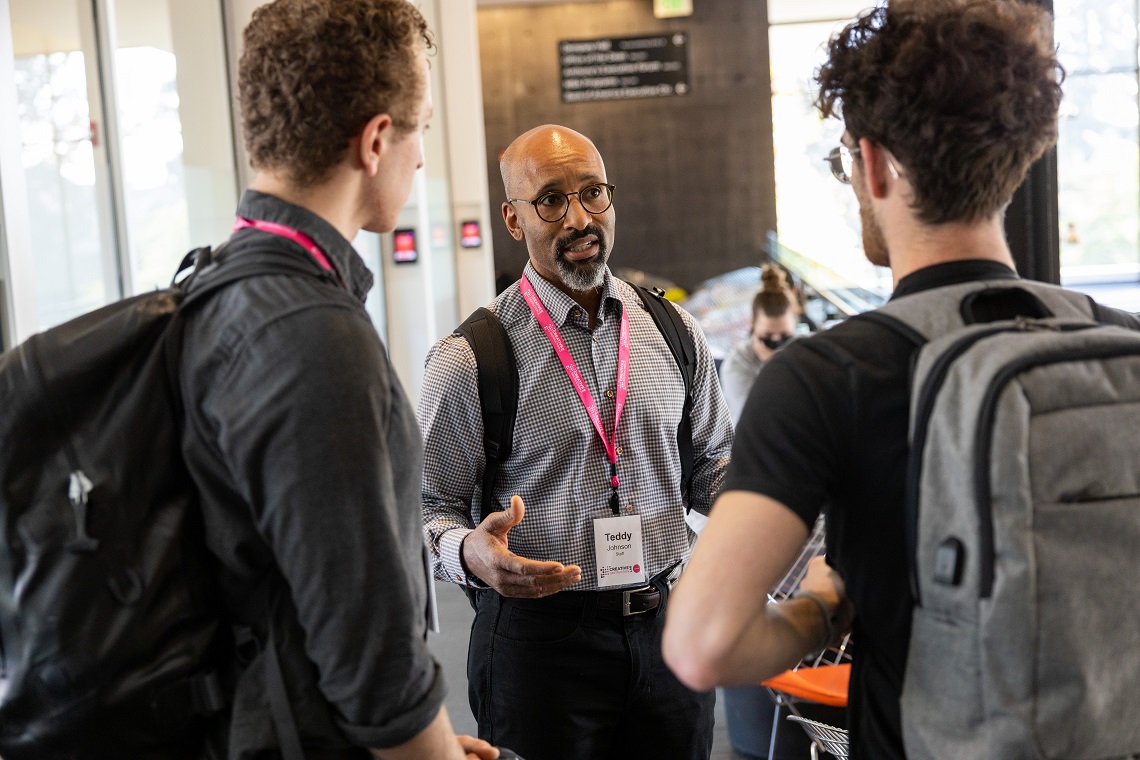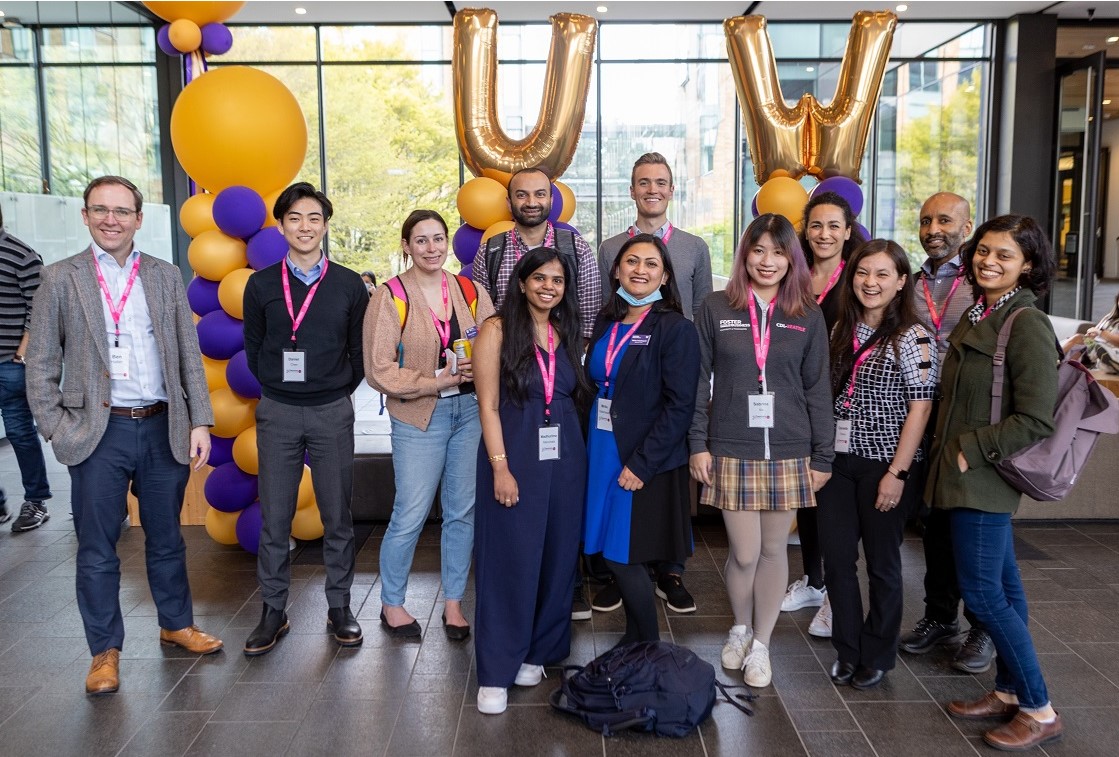Dean’s Impact Scholar Teddy Johnson Unlocks Innovation
Teddy Johnson, in his year as Dean’s Impact Scholar, worked to expand diversity, equity and inclusion
Teddy Johnson is the third Dean’s Impact Scholar at the UW Foster School of Business, serving through the 2022-2023 academic year. His role is part of an initiative started by Dean Frank Hodge to bring in a new leader from the business community each academic year to help faculty, staff and students in their effort to advance diversity, equity and inclusion at the school.
While Johnson is relatively new to Foster, he’s no stranger to the University of Washington. He also teaches in the Creative Destruction Lab at the Foster School, in the Biomedical Regulatory Affairs Master of Science (BRAMS) Program at the School of Pharmacy and in the STEM Program at UW Bothell. And he serves as the director of technology development at UW Medicine’s Institute of Translational Health Sciences (ITHS).
Prior to his UW engagement, Johnson served at both startup and Fortune 500 companies in senior research, design, clinical, marketing and sales leadership roles. He has celebrated two IPOs and four acquisitions, while earning numerous patents and commercializing dozens of new products worldwide.
Johnson is on the executive leadership group of WE-REACH, an organization that works to accelerate the transformation of UW discoveries into innovative products. And he mentors entrepreneurs in Seattle and Silicon Valley.
Foster Business recently caught up with Johnson to see what innovations he’s working on as the Dean’s Impact Scholar at the Foster School.
Foster Business: How would you describe your unique role across the University of Washington?
Teddy Johnson: My main job is to wander around, talk to people and make things happen. My role at the ITHS is really to show researchers how to turn their research into products and products into companies. It’s entrepreneurship training, it’s talking about customer discovery, it’s helping them to see the research that they have, and what products might look like coming out of that. That really draws on everything I’ve ever done in my whole career, as an engineer, doing clinical marketing, and sales.

And I teach. And it’s really wonderful to be able to help students get exposure to this world in a stable safe space so they can learn these tools and to help them figure out if they want to be entrepreneurs.
What has been the focus of your work as Dean’s Impact Scholar at the Foster School?
Christina Fong, the associate dean of inclusion and diversity (when he began the role), and I were tossing around ideas for projects. We landed on writing business cases using minority-owned businesses. We are making a case library to satisfy needs that are completely unmet, and we’re approaching this in a proper design-thinking way. We’re asking professors what cases they need. We’re working with the Consulting and Business Development Center and companies in the Ascend Network. We’re in a unique position where we have access to all these minority-owned businesses, and we have the resources to write the business cases that business education needs.
How do you think the Foster School is doing in expanding diversity, equity and inclusion?
Every time I hear Frank (Hodge) talk, he says something that I really want to hear. We’re trying to make positive change, to be inclusive, to make this a world-class opportunity and institution. I’ve seen him talk a number of times and he keeps saying the same thing. It’s consistent in everything he does.
There is a discussion going on about adding a ‘B’ to ‘DEI.’ That’s for ‘belonging.’ Because if diversity is the goal, it’s easy to say, ‘we just need to recruit more Black people,’ right? But will they feel like they belong?
I was surprised by how much diversity is here already. I think the strong push for diversity—the actual facilitation of attendance and building systems that allow people to land and learn—that’s really made it possible for us to bring people from all over the US and all over the world who bring in a lot of different ideas, which really do lead to solutions. I think we’re actually doing what we say we’re doing.
Research tells us that diversity results in better products and performance. Can you cite an example from your experience?
When we talk about diversity of people, everyone thinks of racial diversity. But we need diversity of thought, of perspective, of ability, too. Because that kind of diversity produces different ideas.
Here’s an example from one of my classes that really excited me. I was having the students solve the problem of running fiberoptic connections in seawater. Obviously, there’s going to be a lot of corrosion. So, I challenged them to figure out how to solve for that and then present their ideas.

One of my students was from Saudi Arabia. Very different cultural background, very different perspective. His group was thinking in a very similar way—and then this guy came at the problem from a completely different angle and swung everyone’s thinking around. It opened the doors to all these other ideas, and the group came to a really rich conclusion as a result. It wasn’t really his skin color or even where he was from that made the difference in the group’s performance. It was introducing a different way of thinking.
As the Dean’s Impact Scholar, what does the word “impact” mean to you?
When I think about impact, I really think about change in the way people operate. For instance, there is a discussion going on about adding a “B” to “DEI.” That’s for “belonging.” Because if diversity is the goal, it’s easy to say, “we just need to recruit more Black people,” right? But will they feel like they belong?
In my first job at HP, we had this diversity network group. And the HR department gave this group $40,000 to put on events to make minority employees feel more comfortable, make them feel seen and heard. I asked the HR person, “Why are we getting $40,000?” She said to me, “Because we know that 20 years from now, half the people coming out of college are not going to be white. So, if this place is only comfortable for white people, we will really only have access to half the college graduates.”
It was all about belonging.
A lot of the developments you’ve worked on are really innovative—things that haven’t been done before. Any words of inspiration?
The thing I have always told my students is that ten years from now, whatever we’re doing that we think is so genius is going to be obvious. And what’s so difficult today is going to seem transparently easy. So, knowing this, what will I know ten years from now? It’s all about letting yourself believe it’s going to be easy. And then if it were easy, what embodiment would it take? And when you think about things that way—if you lay it out like it’s easy, you won’t shut yourself down.
It has worked for me, and I’ve seen it happen for my students too. I’ll have them work on impossible problems that I don’t have the answer to. And they will solve it. I’ll tell them, “I didn’t know that was possible.”
And they think I tricked them. But I say, “You came up with the solution. I didn’t know whether you could do it. I just pretended it was possible.”
